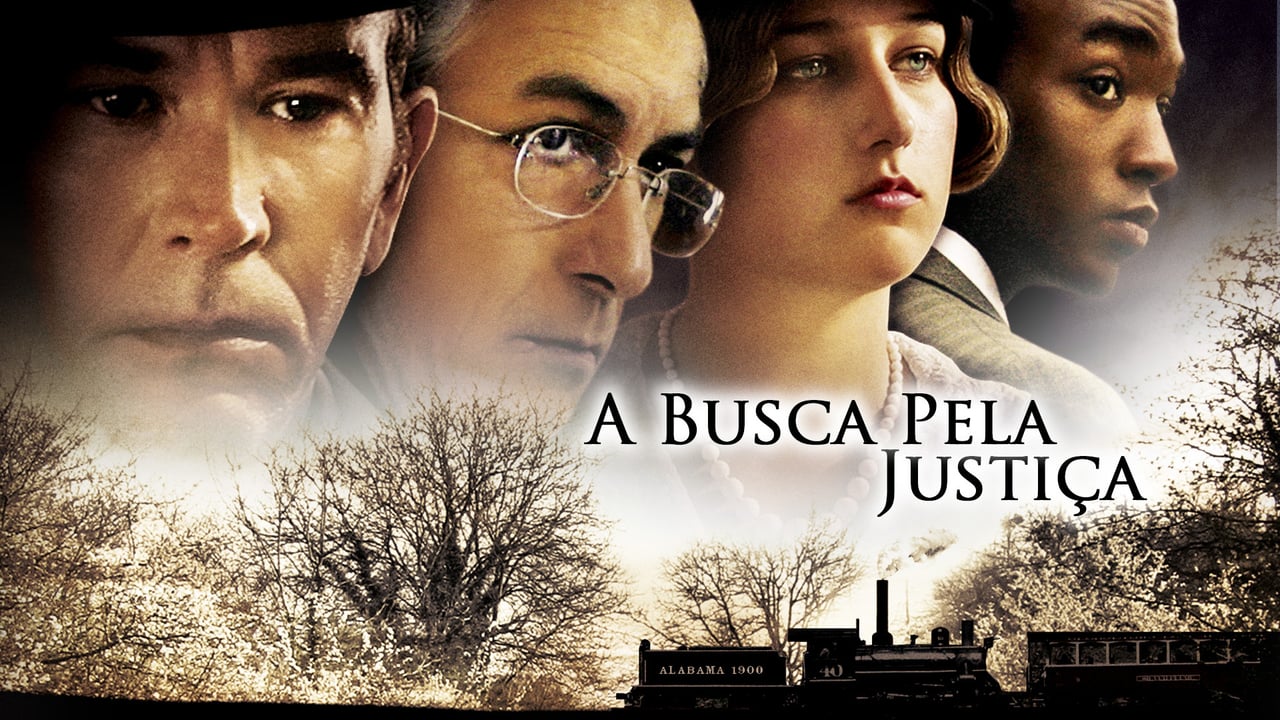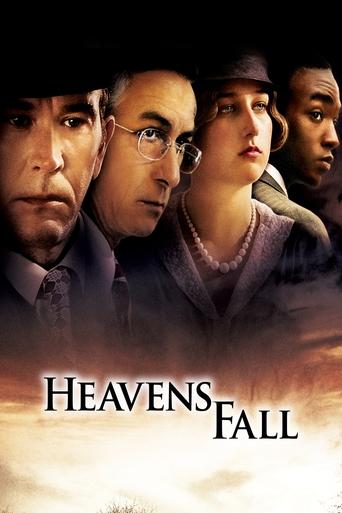Linbeymusol
Wonderful character development!
Supelice
Dreadfully Boring
Lela
The tone of this movie is interesting -- the stakes are both dramatic and high, but it's balanced with a lot of fun, tongue and cheek dialogue.
Staci Frederick
Blistering performances.
Robert J. Maxwell
It's about time Hollywood was able to treat the South as more than a mephitic swamp of ignorant, sneering racists at the bottom and incestuous, decadent, supercilious Gothics at the top. The traditional problems may still exist here and there but the South is no longer a separate country as it was in the early 1930s, when two impoverished, young white women accused a handful of African-American men of rape, in order to avoid doing jail time themselves for vagrancy. Blaming black men for your own crimes is still common enough. It happens in places like Revere, Massachusetts, and Union, South Carolina. Blaming the socially devalued goes beyond the circumstances of 1930s Alabama. Nazi Germany made a national policy out of it, and prim Salem, Massachusetts, had a go at it in 1693.Okay, okay. I'm getting down off the sociological soapbox. Will someone give me a hand? (That game right knee again.) This is a pretty good historical movie. First of all, it's finely acted. Timothy Hutton is Sam Liebowitz, an idealistic New York lawyer, who challenges the jury system and defends one of the boys -- and loses, as usual. But the judge in the case, David Strathairn, plays it fair. That's why he's not reelected and retires to his farm after the trial. And the local DA, Bill Sage, is a genuinely nice guy who happens to believe in his own cause. Liebowitz's opponents are either polite (chuckling over Liebowitz's naiveté) or faceless white jury members who will simply not sully a white woman's reputation and dismiss her allegations against poor black folk. They're guilty almost by definition. If not, why are they in court? And anyway, if they didn't rape the two girls, they probably did something else worth being executed for. In the end, nobody gets the chair, but the young men languish in jail for years after being found guilty.Liebowitz, without his knowing, may have helped lose the case himself. In a café, seeing a black girl waiting for a lunch to be handed to her to take out because she's not admitted into the café. Liebowitz strides over to her, hands her the paper bag, slams down the payment on the counter, and shouts, "What kind of people ARE you?" That's no way to endear yourself to the community from which the jurors are drawn.Liebowitz needed to act more like a cultural anthropologist or a blackmailer, insinuating himself into the town, getting to know the host in a non-threatening, non-demanding way, along the lines of Gene Hackman's character in "Mississippi Burning." If you strike people, they have a tendency to strike back.Of course, it if hadn't been for the alien defense of Liebowitz and the lawyers from the International Labor Board (who bring Liebowitz up short when he gets too self-righteous), who knows what would have happened to the Scottsboro boys? Electrocution probably. Lynching possibly. The 1930s were a tough time for everyone economically, and an early study showed that lynchings in the South varied inversely with the price of cotton. In other words, the price of cotton goes down, the number of lynchings go up. Hmm. Stumbled over that soapbox again.Anyway, the movie left me sad at the outcome of the trial, but overall optimistic. Yes, things were bad then. But look how good they've become since.
gradyharp
Movies such as HEAVENS FALL are poignant reminders of the cruel history of this country that still makes us bow our heads in shame. The story by writer/director Terry Green is a sensitive recreation of the re-trial of an African American man (one of nine) condemned to death in Scottsboro, Alabama in 1931 for the supposed gang rape of two white women, a trial with an all-white seated jury who took only 20 minutes to deliberate and convict the young men. It is a study of racism in the South in the 1930s and while the viewer would hope that the ending is triumphant, the story quietly fades with a particle decency represented by a New York trial lawyer and a sympathetic judge who opened the door to the beginnings of seated African American jurists. It is powerful in content: it is magnificent movie making.Samuel Leibowitz (Timothy Hutton) travels to Alabama form his offices in New York in 1933, to represent the nine condemned men after a Supreme Court ruling opened the door for a retrial. Leibowitz meets the prosecuting attorney Thomas Knight, Jr. (Bill Sage), more devoted to his potential career advancement than to his role as prosecutor, and the judge assigned to the case - James Horton (David Strathairn). Leibowitz interviews the nine condemned men and Haywood Patterson (B.J. Britt) is the first to be re-tried. Careful investigation uncovers the shaky case that convicted the men and Leibowitz, with the aid of the attorneys who pleaded the case before the Supreme Court, attempt to gain a racially mixed jury without success. Sent to cover the trial is a young reporter from Chicago (Anthony Mackie) who witnesses the racial hatred in the South first hand. His presence adds credibility to the proceedings. During the trial Leibowitz calls as witnesses the two women who made the false accusations - Victoria Price (LeeLee Sobieski) and Ruby Bates (Azura Skye) - and despite evidence clearing the nine men the trial ends in defeat. But that is only the beginning of a story that persists to this day. This is a true story about how racial hate tore the South apart in the 1930s, but it is also the story of how a few honest people tried to alter history.The cast is uniformly excellent, with Strathairn, Hutton, Skye, and Sage giving potent performances. The climate of the times is well captured by the cinematography of Paul Sanchez, the costumes by Lisa Davis, the fine editing by Suzy Elmiger, and the simple but effective musical score by Tony Llorens. This is a film everyone should see, not only because of the need to re-examine this part of our history, but also because it is such a fine example of American cinema. Grady Harp
neuliebj
this film is awesome, the story is breathtaking, the actors wonderful. I saw it at the Midwest Screening and the theater was completely spellbound. It has the heart and soul of "To Kill a Mockingbird". The scenery is so beautiful and interesting. The storyline is inspiring. No wonder Timothy Hutton chose to take this role, his character is smart, courageous and in this current political climate he is a hero for us. The rest of the cast wonderful, realistic and also multidimensional. The historical representation is authentic and yet very creative. You leave the movie inspired. What more can you ask for? Thank you for making such a thoughtful and entertaining film!! I know it will go far.
sleepycat-1
I had the great pleasure of seeing the East Coast Premiere of "Heavens Fall" at the Stony Brook Film Festival, Long Island, NY on July 20, 2006.Timothy Hutton gave a riveting performance as defense attorney Samuel Leibowitz. In my opinion it was his best since his equally fine portrayal of Archie Goodwin in "Nero Wolfe." Bill Sage as prosecuting attorney Thomas Knight, Jr. and David Strathairn as Judge Horton were also excellent in their roles. Bill Smitrovich as co-defense attorney, Maury Chaykin in a cameo role as a bigoted insurance salesman, Francie Swift as Leibowitz' wife, Belle, and James Tolkan as Thomas Knight, Sr. (four other "Nero Wolfe" actors) were exceptional, too, as was B.J. Britt, Haywood Patterson, in his film debut. LeeLee Sobieski and Azura Skye as Victoria Price and Ruby Bates were marvelous in their extremely difficult roles.The score by Tony Llorens was haunting - a perfect accompaniment for the plot and the beautiful cinematography by Paul Sanchez. This fine movie with its superb acting, splendid score, and beautiful cinematography had only been seen in the US by festival audiences, but it is now available to a broader audience. (US DVD release, November 6, 2007) The DVD includes two "behind the scenes" documentaries by Charley Rivkin with additional footage by Adam Witt. The first, "Creating The Fall," includes interviews with Terry Green, Timothy Hutton, Bill Sage, David Strathairn, Anthony Mackie, LeeLee Sobieski, and Azura Skye with their thoughts on the movie and the subject matter. The second, "Surviving The Fall," is about the difficulties the cast and crew endured and heroics they performed when Hurricane Ivan interrupted the filming of "Heavens Fall."

